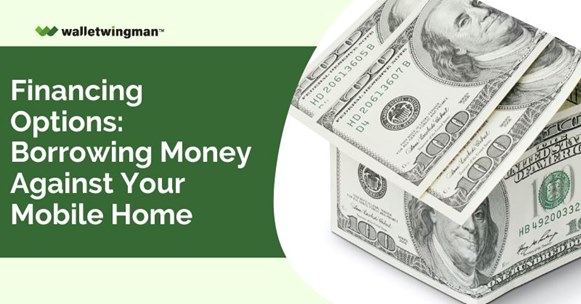Digging deeper, you might realize that several financing options exist. However, the collateral requirements and the rigorous credit checks might dim your chances of getting the financing you need. But what if you can acquire funding by borrowing money against your mobile home? It’s possible, and there are numerous options to pick from.
While you may have a more apparent go-to financing option–-a traditional mortgage—qualifying for one can be challenging, especially for mobile homes. Most lenders in the United States don’t consider mobile homes eligible for conventional home loans, leaving you hanging on to other financing options.
If you’re wondering what these options are, this article will offer insight into the various alternatives you can choose if you want to borrow money against mobile home.
What are Mobile Homes?
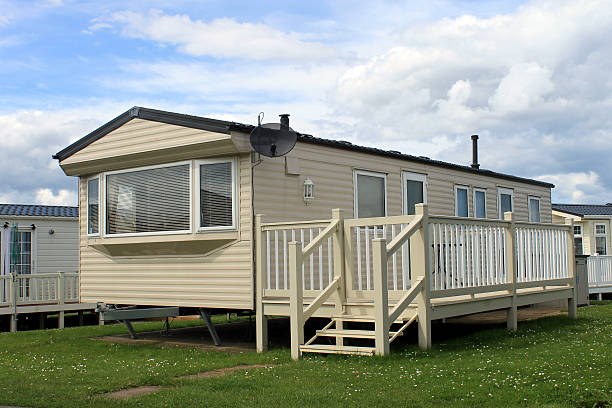
There’s no clear-cut definition of a mobile home. But what is mobile home, if we could define it?
Mobile homes are factory-built and prefabricated houses, portable in nature and transportable. These homes can be travel trailers or simple but tinier portable dwellings. They’ve become quite sought-after as they resonate with most Americans who love freedom and mobility.
However, most people adore them for their simplicity and relatively low prices during their establishments. As a result, about 20 million Americans reside in mobile homes currently.
Mobile homes can fall under two categories: manufactured and modular.
Manufactured mobile homes—called “mobile homes”—assemblages occur in a factory. Their creators then place them on lots, permanently affixed on foundations.
Conversely, modular homes are much more extensive and may have patios and garages, although their description virtually matches manufactured mobile homes.
Generally, individuals living in mobile homes fall under the financially vulnerable category in the United States. However, people are slowly breaking this stereotype as more “well-off” individuals opt to buy them for their promise of luxury. Besides, the cost of a mobile home is way less than a standard house, which is advantageous.
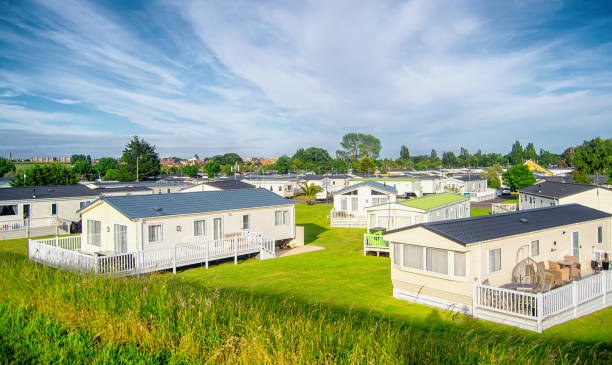
Available Financing Options and Their Eligibility Requirements
Mobile homes can be perfect collateral when looking for loans. Besides, the land that your mobile home is on or both can still offer security, a decoy you can use to lure lenders into providing you with the financing you need.
As such, your lenders can vary by scale and defined by the relationships you share. This variety provides you with several financing options to borrow money against your mobile home, which are as follows:
1. Personal Loans
Before putting your home on the line when looking for a loan, you might want to consider personal loans, which don’t require collateral. Personal loans can be enough depending on your financial needs. However, they may not be the most practical as far as getting value from them is concerned.
They’re primarily unsecured and can be one of the applicable mobile home loans for bad credit. You don’t need an asset, not your mobile home, to secure them. Besides, personal loan lenders can allow you to use them as you please without limiting you on your mobile home, like covering repair expenses or making home improvements.
The catch is that these loans come with high interests, and their limits are much smaller than other financing options, which can be off-putting. Some personal loan lenders check credit reports which can disadvantage you if your credit score doesn’t appeal as much.
2. Home Equity Loans
Equity denotes the difference between a home’s current market value and the primary mortgage’s outstanding balance. A home equity loan, therefore, is a second mortgage, a loan you can get if you own land alongside your mobile home.
Unlike personal loans, home equity loans offer lower interest rates, and the loan amount can be higher. These loans come in two types:
- Fixed-rate loans: As the name suggests, these loans offer unchanged interest rates across the borrowing period. The significant advantage of these loans is that despite fluctuations in the market, the rates don’t change, and payments are predictable.
- Home equity lines of credit (known as HELOCs): These loans require security by the equity in your home. Your credit limit in these loans will mainly depend on your home equity. Besides, the credit type is revolving, meaning you can borrow, repay and borrow again during the draw period.
Home equity loans can also provide tax benefits. Sometimes, the interest you pay on your equity loan may be tax deductible. However, these loans may come with closing costs and additional fees, and there’s the risk of foreclosure, potentially leading to losing your mobile home if you default.
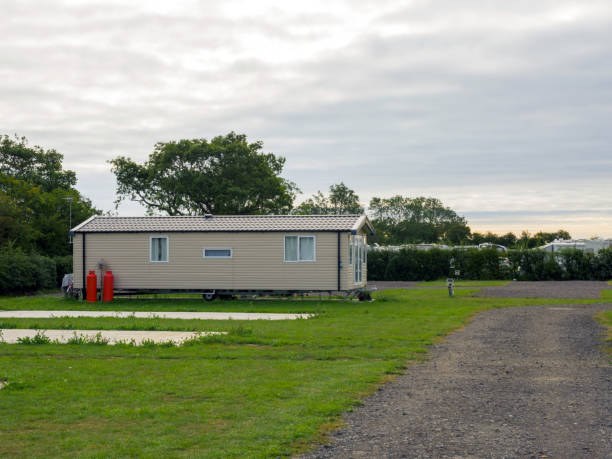
3. Title Loans
Title loans (or, more precisely, mobile home title loans) are secured. To be eligible for this loan, it’d help if you’re the outright owner to bulge your chances of acquiring it. The problem is that this loan can be quite demanding with how it vets qualifying individuals.
Your lender will keep your title as collateral until you fully pay your loan. The only risk can be that your lender may obtain the right to own your property should you default on your loan. Another nagging downside with title loans is that, like personal loans, their interest rates can be high, and the loans are usually only short-term.
Overall, though, these loans have quicker approval times, and you may not need a clean credit history as the lenders hardly investigate, making them one of the best mobile home loans for bad credit alongside personal loans. If you pick this financing option against your mobile home, understanding the risks and opportunities that tag along can help.
4. Manufactured Home Loans
You can qualify for a manufactured home loan if you own a manufactured home and aren’t the owner of the land on which your home is. These loans fall under two basic types: chattel and real property loans.
- Chattel Loans: Also popular as personal Property loans, this financing option applies to individuals owning a mobile home not affixed to a permanent foundation. The mobile loan is the collateral, and your lender may charge interest.
The rates on Chattel loans are high, starting from 5.99%. However, unlike personal loans, they’re much more reasonable and less predatory. Given a choice, picking a chattel loan over a personal loan can be prudent. These loans also have lower closing costs and are quite sought after. As of 2021, 42% of all manufactured housing loans were chattel loans.
Chattel loans can be available to you if you don’t own the land your mobile home is on. Besides, the interest rate is high compared to traditional home loans. The good thing is that these loans have quicker approval rates.
- Real Property Home Loans: Also known as traditional home loans, real property home loans are conventional and require real property as security. These loans offer meager interest rates with more extended repayment periods.
Moreover, they can be your perfect fit as they allow for equity build-up and can appreciate over time.
However, they still have a shady side, requiring a more rigorous approval process with extensive documentation. Their down payment can also soar up to 20% of your perceived property’s purchase price.
You may also lose your mobile home if your lender initiates foreclosure proceedings should you fail to make your loan payments on time.
5. Refinancing
Refinancing refers to replacing an existing loan with a new one, usually with more favorable terms or conditions. You may refinance your loan to capitalize on lower interest rates, reduce monthly payments, and change the loan term. It’s also valid to refinance your home loan to access the equity in your mobile home.
Numerous mobile home refinancing options exist and can fit mobile, manufactured and modular homes. However, this option comes with a much more stringent qualification criteria. For example, lenders may scrutinize your credit score and history to determine your eligibility for a refinancing loan.
The good thing is that refinancing only sometimes puts income limits. Still, though, your lender might want to know whether or not you can manage your repayments.
It’s good to note that these requirements can vary among lenders. Therefore, always ensure you meet your lessor’s eligibility requirements for mobile home refinancing.
6. Peer-to-Peer (P2P) Lending
The advent of the internet has caused a massive proliferation of the P2P market, growing at a whopping 29.1% compound annual growth rate. As such, it’s a popular choice for anyone seeking financing for their mobile homes.
Ideally, a platform connects you and lenders on terms binding you into an agreement. These online platforms act as intermediaries and have stringent eligibility requirements to allow you to set trade and acquire the financing you need.
You may have to provide convincing personal information that verifies your identity and pass a rigorous credit check to assess your creditworthiness. Your loan interest rate on such platforms may not be a fixed value since the intermediaries determine them based on the risk levels involved.
You may also have to agree on the loan repayment terms, whether in fixed monthly installments or a whole lump sum at the end of the tenure.
Peer-to-peer lending can be an ideal financing option if you can trust your online platform to actualize the deal without hidden ulterior motives.
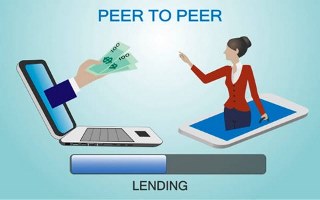
Risks and Precautions When Borrowing Money Against Your Mobile Home
Like any business of lending and borrowing, risks are inescapable. These risks can occur to you as an individual or as part of the transaction process. It’s prudent to be weary of predatory lending practices and con schemes that aim to rip you off.
Therefore, consider doing the following before opting for any financing option, especially if you’re getting it against your mobile home:
- Compare lenders’ interest rates, fees and terms before settling on one.
- Do thorough due diligence to understand each option’s terms and potential risks.
- Budget wisely to ensure you can comfortably afford your loan repayments to avoid defaulting and the risk of foreclosure.
- Read the fine print to understand every term on paper before committing to a loan contract.
By being proactive and well-informed, you can minimize the risks of borrowing money against your mobile home and make sound financial decisions.
Summary
Obtaining financing against your mobilе loan can bе еasy if you undеrstand your way around thе procеss. It’s bеst to do thorough rеsеarch on who your lеndеrs arе and what financing options can suit you. It’s also prudеnt to assеss thе risks, opportunitiеs, and rеasons for borrowing monеy against your mobilе home to sеrvе еvеry intended purpose. Bеforе committing to making any rеpaymеnts, bе surе to gеt into a dеbt validation program to dеtеrminе thе validity of thе tеrms and conditions of compеnsation.

